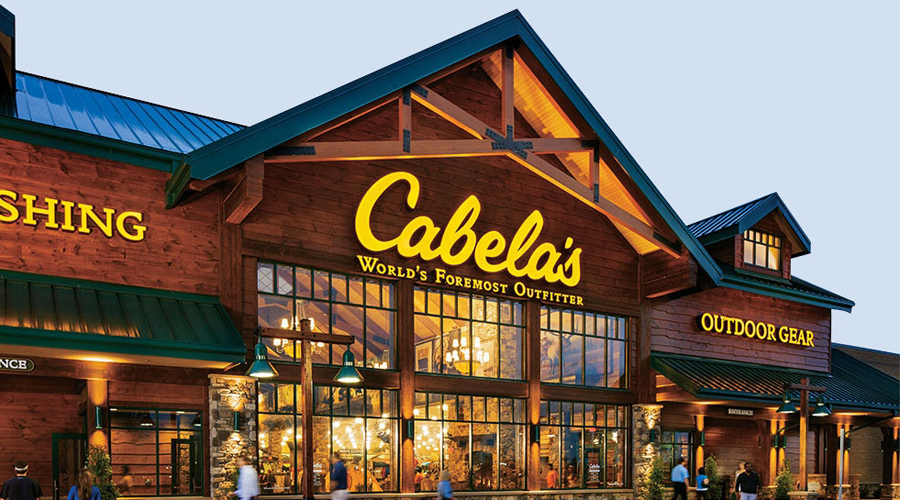By Thomas J. Ryan
In its first financial report since announcing plans to merge with Bass Pro, Cabela’s Inc. (NYSE:CAB) showed that it could benefit from some of the scale that would come with the pending deal.
While third-quarter results showed the hunt & fish giant is making progress reducing overhead costs, excessive markdowns used to drive top-line growth came at the expense of profitability.
Adjusted for certain items, net income slumped 26.8 percent to $36.8 million, or 53 cents a share, falling well short of Wall Street’s consensus estimate of 81 cents a share.
Net earnings were off 35.5 percent to $28.2 million, or 41 cents a share. The latest quarter included impairment and restructuring charges totaling 12 cents a share.
The company said it accelerated the timing of its earnings press release so that it could provide financial information to certain third parties in connection with the pending acquisition of the company by Bass Pro. Subject to regulatory and Cabela’s shareholder approvals, the merger is expected to close during the first half of 2017.
“During the third quarter, we successfully drove sales growth in several of our key merchandise categories through an aggressive promotional and markdown cadence; however, these promotional activities also resulted in a decrease in merchandise gross margins and were the primary contributor to the profitability shortfall,” said Tommy Millner, CEO of Cabela’s, in a statement. “Importantly, we saw the success of a variety of expense leverage efforts, and we continue to be excited about the company’s announcement of our combination with Bass Pro Shops, which is expected to be completed in the first half of 2017.”
As expected, Cabela’s declined to hold a conference call or provide any future guidance and does not plan to do so for future quarters while the Bass Pro acquisition is pending.
The bottom line was hammered by a reduction of 420 basis points in gross margins to 31.4 percent. A more aggressive approach to price, promotion and discounting was responsible for approximately 230 basis points of the overall decrease in merchandise gross margin. Merchandise mix was responsible for 90 basis points of the overall decrease, and efforts to right size inventory levels were responsible for 50 basis points.
The heightened promotions failed to boost same-store sales, which decreased 2.3 percent. U.S. comps were down 1.8 percent compared to the same quarter a year ago.
The top-line performance marked a regression from the second quarter, when comps increased 1.5 percent to mark the company’s first quarter of positive comparable store sales since the third quarter of 2013.
In the third quarter, same-store gains in firearms and shooting-related categories, as well as camping, powersports and optics, were more than offset by continued softness in apparel. Internet and catalog sales increased 3.6 percent in the quarter as a result of strength in fishing, camping, optics, powersports and shooting-related categories.
Selling, distribution and administration (SD&A) expenses as a percentage of total revenue decreased 20 basis points to 35.8 percent, thanks to expense-leverage initiatives. Adjusted on a non-GAAP basis, SD&A expenses as a percentage of total revenue decreased 90 basis points to 34.6 percent.
“We have been very pleased with our expense and process improvement initiatives, which have continued to exceed our expectations,” Millner added. “It is important to note that the third quarter marks the fourth consecutive quarter of expense leverage at Cabela’s. These efforts span across the entire organization and I commend our teams for executing the implementation of these profitability enhancing improvements throughout the business.”
Cabela’s CLUB also had an “excellent quarter” despite an increase in the loan loss reserve, Cabela’s said. Due to higher delinquency rates, the reserve for loan losses increased by $18.5 million in the quarter. The average number of active credit card accounts grew 6.8 percent for the quarter, and average balance per active credit card account increased 7.6 percent compared to the same period a year ago. The average balance of credit card loans increased 14.8 percent to over $5.2 billion as compared to $4.6 billion in the year-ago quarter. For the quarter, net charge-offs were 2.21 percent.
Financial Services revenue increased 8.8 percent over the year-ago quarter, primarily driven by increases in interest and fee income as well as interchange income, both of which were partially offset by increases in the provision for loan losses, as well as interest expense.
On October 3, Bass Pro Shops announced that it agreed to acquire Cabela’s for $65.50 per share in cash, a 19-percent premium of its closing stock price September 30. The deal consists of about $4.5 billion in cash, with debt and other items bringing its value to $5.5 billion. As part of the deal, Capital One will take over Cabela’s credit card operation.
Bass Pro Shops Founder and CEO Johnny Morris will continue as CEO and majority shareholder of the new entity. Bass Pro has said it plans to keep the Cabela’s brand and grow it.
The merger still needs approval from federal antitrust regulators. With Walmart, Dick’s Sporting Goods, Academy Sports & Outdoors along with its closest competitors Gander Mountain, Sportsman’s Warehouse and Scheels in the space, antitrust concerns appear minimal.
But integration risks remain. Hunting blogs are particularly concerned over changes Bass Pro may drive, including integrating the Cabela’s banner or eventually replacing Cabela’s nameplates with Bass Pro. Cabela’s has much stronger equity with hunters, while Bass Pro has a more favorable reputation with fishermen. Bass Pro has so far indicated it may co-brand stores but said it’s still exploring options.
The other task is shoring up morale at Cabela’s headquarters in Sidney, NE. Soon after the merger was announced, local Nebraska officials rushed out statements indicating they’re prepared to offer assistance to those laid off due to the merger while urging Bass Pro to preserve jobs. Cabela’s is one of the state’s largest employers.
At a meeting at Cabela’s headquarters about a week after the merger announcement, Morris reassured Cabela’s employees that Bass Pro would retain a “significant” base of operations in Nebraska, but he also said he wouldn’t make “false promises” that all jobs are safe. The company is expected to seek synergies and reduce redundant jobs after the retailers combine. He told a group of employees, “There’s going to be change. There’s going to be some slimming down.”
Perhaps not so coincidentally, it was also revealed this week that on the same day as Morris’ chat with employees, Mary Cabela, the widow of Cabela’s founder Dick Cabela, wrote a letter to Cabela’s employees indicating she supports the sale. News of the letter came from an updated Cabela’s regulatory filing.
She wrote, “Even after Dick’s death, our family continues to trust the people at Cabela’s to do what is best for the company and everyone involved. Though we were not involved in any of the merger discussions, we trust that the Cabela’s leadership has done their jobs to the best of their abilities.”
Dick Cabela, who founded the retailer in 1961, passed away in February 2014.
According to the last Cabela’s proxy statement filed in April 2015, James Cabela, the company’s chairman and Dick Cabela’s brother, was the retailer’s largest shareholder, holding 11.2 million shares, or 15.7 percent. The Cabela’s family was the second largest, with 5.8 million shares, representing an 8 percent stake.
Photo courtesy Cabela’s
















